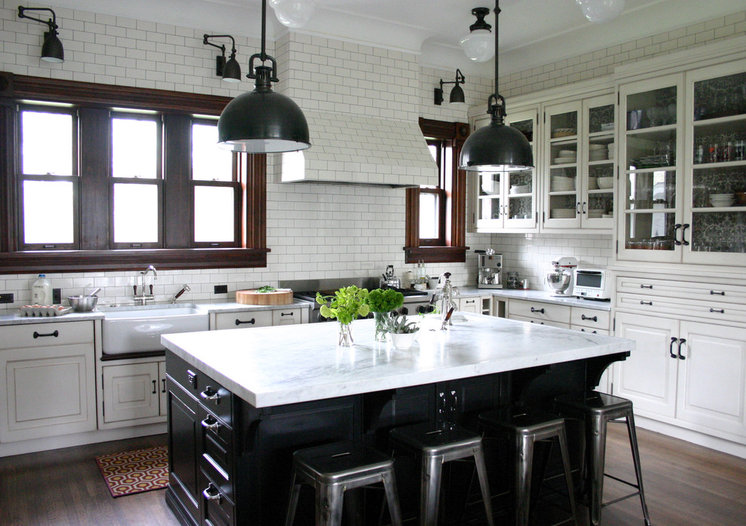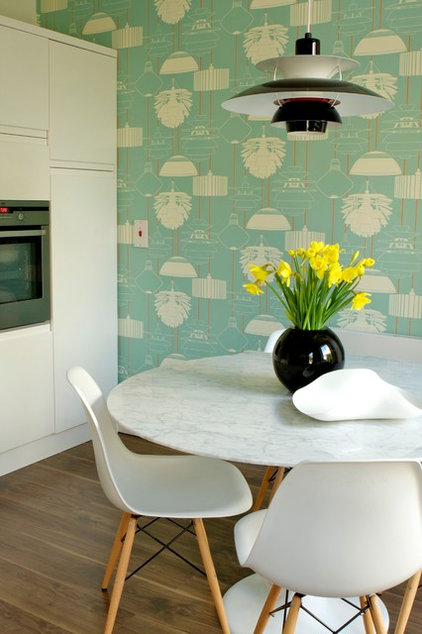This was posted by our friends at Houzz.com, and we wanted to pass this along b/c so many people come into our showroom inquiring about Marble Countertops, but ultimately talk themselves out of due to “maintenance issues.”
What most people don’t love, however, is the concern that comes with cleaning and caring for the popular, porous surface famously susceptible to etching and staining, especially in the kitchen.
Luckily, according to marble experts, where there’s a will, there’s a way, and caring for the classic beauty of a marble surface may be easier than you think. Here’s how to clean marble countertops.
Keep It Clean
“What people have to look out for is not necessarily staining, but etching,” Laney says. “Because anything that is acidic is going to etch the surface. That’s just the way it is.”
Etching on a marble surface happens when something like lemon juice, alcohol or tomato sauce is splashed, dripped or spilled onto it. If it is not wiped up right away, the acid reacts and eats away at the calcium carbonate in the stone, creating permanent markings that look like dull, slightly darker spots or rings on the marble. How light hits the marble determines how noticeable the etching is. In some light, the scarring will not be evident at all, while certain lighting will reveal the dulled areas.
Many consumers visit restaurants, ice cream parlors, bars and other public venues that use marble countertops to check out what a working marble surface looks like and to decide whether they can happily live with the reality.
Good to Know
Avoiding acidic solutions’ coming into contact with marble applies to cleaning products as well. The Marble Institute of America, or MIA, advises against using vinegar, lemon juice or other cleaners containing acid on marble, including bleach. Experts instead recommend only mild soap and water. “There’s nothing on a countertop that you can’t get off with soap and water,” Laney says.
Wiping down countertops and surfaces with warm, sudsy water and a nonabrasive sponge or cloth is the best method for cleaning, but it will not remove etching or stains that have had time to permeate the surface.
The most popular marble finishes are polished and honed. A polished finish has a glossy surface, reflects light and shows off the color and markings in the marble.
A honed finish is more satiny and smoother, with little light reflection, according to the Marble Institute. This finish is common for floors, stairs and other heavily trafficked locations.
“When you buy a honed piece of marble, it’s already etched,” Laney says. “Let’s say you cut a lemon and cause some etching on the surface. You will never see it, because it is already etched.” The tradeoff: Honed marble is more porous and will stain more easily. “A polished piece of marble will stain less but etch more,” she says. So pick your poison.
She uses a cleaner twice a month on her marble countertop. “I don’t have one stain on my marble countertop,” she says, “I have etching, but I don’t have stains.”
Organic stains (coffee, tea, fruit, food): Clean with a mixture of 12 percent hydrogen peroxide and a few drops of ammonia.
Water spots and rings: Buff with dry #0000 steel wool.
“If your counter does end up staining, you can have a professional come in and take the sealer and the stain off,” Laney says. “But what’s going to happen is you are going to end up with a honed countertop, because you can’t repolish the installed marble like you would at the fabricators or the stone suppliers.”
After you have applied the paste, the MIA advises covering it with plastic wrap and using painter’s tape to tape the edges down. Let it sit for 24 to 48 hours. After that, remove the plastic and allow the poultice to dry. The drying process should pull the stain from the stone.
Once it has dried, remove the mixture (using a wood or plastic scraper if necessary), rinse with distilled water and buff dry with a soft cloth.
Repeat if necessary.



Leave A Comment